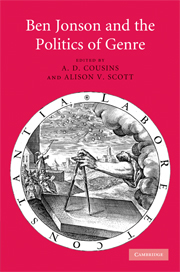Book contents
- Frontmatter
- Contents
- Notes on contributors
- Acknowledgements
- Introduction
- Chapter 1 Feigning the commonwealth: Jonson's Epigrams
- Chapter 2 The Jonsonian masque and the politics of decorum
- Chapter 3 The politics (and pairing) of Jonson's country house poems
- Chapter 4 Style, versatility, and the politics of the epistles
- Chapter 5 Jonson's politics of gender and genre: Mary Wroth and ‘Charis’
- Chapter 6 Jonson's metempsychosis revisited: patronage and religious controversy
- Chapter 7 Jonson's humanist tragedies
- Chapter 8 A generic prompt in Jonson's Timber, or Discoveries
- Bibliography
- Index
Chapter 7 - Jonson's humanist tragedies
Published online by Cambridge University Press: 30 June 2009
- Frontmatter
- Contents
- Notes on contributors
- Acknowledgements
- Introduction
- Chapter 1 Feigning the commonwealth: Jonson's Epigrams
- Chapter 2 The Jonsonian masque and the politics of decorum
- Chapter 3 The politics (and pairing) of Jonson's country house poems
- Chapter 4 Style, versatility, and the politics of the epistles
- Chapter 5 Jonson's politics of gender and genre: Mary Wroth and ‘Charis’
- Chapter 6 Jonson's metempsychosis revisited: patronage and religious controversy
- Chapter 7 Jonson's humanist tragedies
- Chapter 8 A generic prompt in Jonson's Timber, or Discoveries
- Bibliography
- Index
Summary
The first plays that Jonson chose to preserve in the 1616 Workes were the comedies Every Man In His Humour, Every Man Out of His Humour, Cynthia's Revels, and Poetaster. Only after these four came his first extant tragedy, Sejanus his Fall. Another seven years, and three major comedies, passed before he wrote his second and last tragedy, Catiline. If one adds the plays published after 1616, the proportion of comedy to tragedy in Jonson's oeuvre is (ignoring the fragment Mortimer) fifteen to two. Such a figure seems decisive, and certainly reinforces statistically the consensus regarding Jonson's dramatic strengths and weaknesses.
And yet the picture it paints of the early part of Jonson's career at least is a false one. From the time of his first appearance as a dramatist sometime in the early 1590s, up to and beyond his success with Every Man In (1598) and Every Man Out (1599), Jonson was best known, and probably saw himself, as primarily a writer of tragedies. It was as a tragedian that he was praised in 1598 by Francis Meres:
[S]o these are our best for Tragedie, the Lord Buckhurst, Doctor Leg of Cambridge, Docter Edes of Oxford, master Edward Ferres, the Authour of the Mirrour for Magistrates, Marlow, Peele, Watson, Kid, Shakespeare, Drayton, Chapman, Decker, and Beniamin Iohnson.
Of these names, only Shakespeare and Chapman recur where we would expect to find Jonson, in Meres' ‘best for Comedy’ category.
- Type
- Chapter
- Information
- Ben Jonson and the Politics of Genre , pp. 162 - 189Publisher: Cambridge University PressPrint publication year: 2009
- 3
- Cited by



